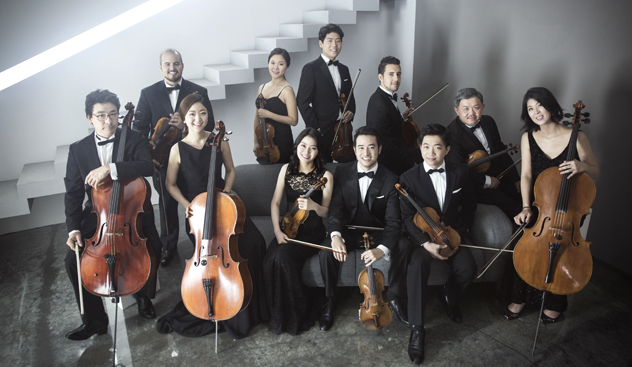

World Premieres
2016-2019 2008-2009 2006-2007 2001-2005
2007/2006: Summer Grasses and Awakened from Haiku for Voice and Strings
Gordon Shi-Wen Chin (b. 1957)The Fourth Annual Great Mountains International Music Festival
Nunmaul Hall, Yong Pyong Resort - Gangwon Province, Korea
"The first time I heard Sejong was when they performed Formosa Seasons, a violin concerto of mine, in 2003. I was impressed not only with their extremely high quality of music playing, but also the special kind of intimacy that was present, maybe due to the absence of a conductor. So when I had an opportunity to explore my newly found haiku-images, I immediately thought Sejong would offer the most desirable "conditions" to carry out my musical ideas.
The voice, added in the midst of the strings, serves more as a commentator and a guide than as a singer. Initially this work was intended only for strings, but for some reason I kept hearing a voice that kept murmuring, sighing, humming, and even "anguishing." Not surprisingly, I realized the vocal sounds were coming from my intensive intention to express the poems. Then I said to myself, why not leave them on the pages, since they definitely open a channel to the meaning of the music. Consequently, the role of the voice appears only sporadically to remind us what the music is about, without becoming emotionally saturated."
Summer Grasses was completed near the end of 2004; Awakened, was added in May of 2006. I would like to dedicate this work to Sejong and its distinguished music director, Mr. Hyo Kang.
2006: Love Past Cure
Monteverdi (1567 - 1643)Madrigals by Claudio Monteverdi with sonnets by William Shakespeare
Created by Edward Berkeley and Kenneth Merrill
La Jolla Music Society Summer Fest, MCASD Sherwood Auditorium - San Diego, CA
Monteverdi meets Shakespeare: an improvisation in which two 17th Century Masters come together to celebrate and soothe the fever that love brings. In madrigals and sonnets, songs and words, sympathetic strings heal the love-torn hearts of five singers.
2006: Four Seasons of PyeongChang
Sukhi Kang (b. 1934)The Third Annual Great Mountains International Music Festival
Gangneung Art & Culture Hall, Gangneung City - Gangwon Province, Korea
"The four seasons in the mountains can be told simply by the color and the scent of the grass. The clouds, winds, and energy of heaven and earth alter as the seasons change. The changes are all part of the life cycle of the forest. The budding, blooming, ripening, and the selflessly inevitable departure are all part of the inherent cycle of the four seasons. The slowly budding spring transforms into fickle and animated summer days. Autumn comes to us with a great sense of abundance, which then segues into winter full of intense tension and strain. Winter, the most emotionally charged season, contains all the potential of life in its dark and moist womb, waiting to burst into spring again. The tireless movement of life, the infinite cycles of truth, and the ending that is also the new beginning are all contained in the season of winter.TheFour Seasons of PyeongChang is composed of eight movements. Of the notes used, the harmonics create the backdrop for the overall tone of the music. In some cases, different modes and whole tones are used and in others, complicated twelve-tone modes are used. At some points, the rhythmic repetitions make up the overall scheme. In other parts, the rhythms are used either in unison or to create rhythmic time differentials."